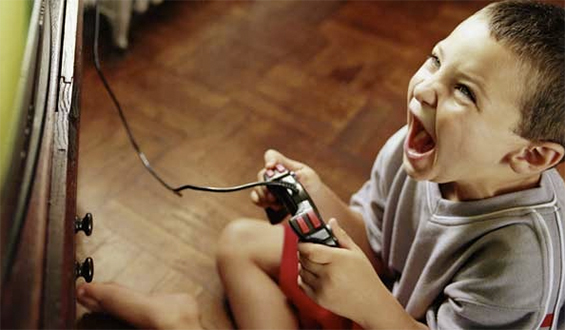
An Iowa State University study published in the Journal of Consumer Affairs has found that parents who are “anxious or emotional” are more likely to have children who play violent video games.
The UK’s Mirror reports that the research showed mothers and fathers who were “warmer or restrictive” were better able to limit their children’s time playing violent games. Russell Laczniak, a professor of marketing at Iowa State University, wanted to find out how parents influence their children’s behavior, especially because of concern over potential harmful effects of violent video games.
“It’s not surprising that warmer and more restrictive parents, or what we call authoritative, are most effective at reducing the amount of violent video games played by their children. If parents are more anxious, their message is not as well received by their children and it inhibits what they’re trying to do. It’s pretty clear from our study that’s what’s happening with kids playing violent video games.”
Laczniak collaborated with professors at the University of Nebraska, Kansas State, and Utah State, report Pat Powers of KQWC and O. Kay Henderson of Radio Iowa. He found that if children are already playing violent video games, this research shows parents can limit that level of playing.
Last year in the US, approximately $13 billion worth of video game hardware and software was purchased.
Researchers surveyed eight- to 12-year-old kids, since this age span is an impressionable time in children’s lives and is when many children begin playing video games. The researchers discovered that the effect was more pronounced in boys and first-born children, likely because parents are more anxious and attentive with their first child. Also, kids of this age become more open to influences outside the family and from their peers. Laczniak said that some wonder if it is even possible for parents to continue to have a degree of control, and that the results of the study show they can.
The last part of the study was a survey given to 237 sets of caregivers and children who answered the survey separately. For the purposes of the study, three parental profiles were used: warm, restrictive, and anxious-emotional. Warm parents generally do not use physical discipline, but rather show their children approval through affection. Restrictive parents set up firm rules for the family and enforce them when necessary. Anxious-emotional parents are mostly overprotective and overly emotional with their children.
It was no surprise to the team that warm or restrictive parents would have children who did not spend as much time playing violent video games, but they were surprised with the impact anxious-emotional parents had on their kids, even though they were aware of former studies which determined that children of anxious-emotional parents are more likely to have problems in general.
The scientists believe the lesson is that setting limits and being more “calmly detached” in their relationships with their children will make a positive difference, writes Rick Nauert, PhD for PsychCentral.
“If parents want to reduce the amount of violent video games that their kids play, be warm when dealing with them, but somewhat restrictive at the same time, and set rules and those rules will work,” Laczniak said. “For parents, who are more anxious, the rules become less effective and those kids are going to play more.”




